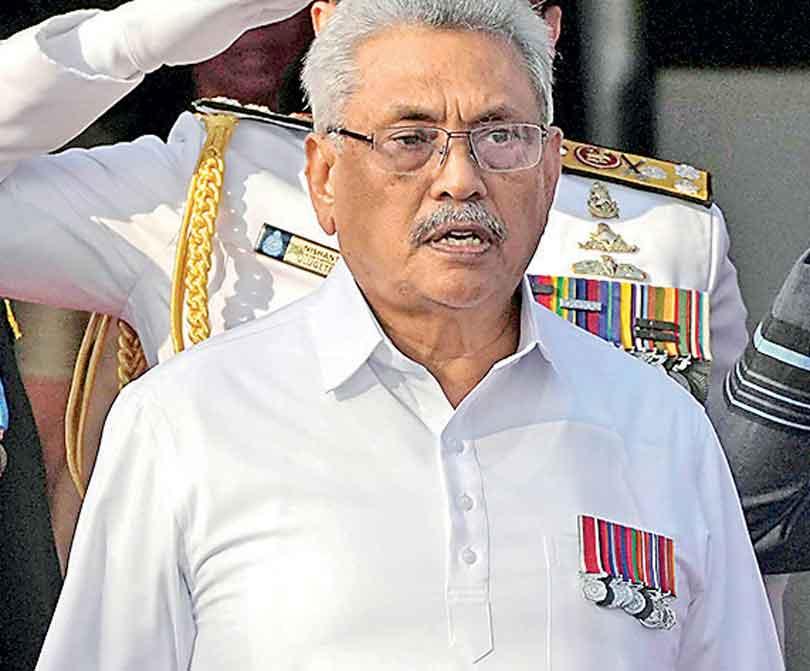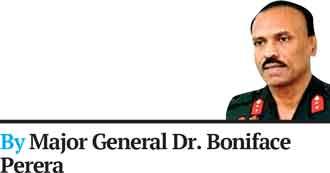The Unravelling of a Presidency: Why Gotabaya Rajapaksa Failed in 2022
1 August 2025

A major and ultimately destructive flaw of Gotabaya Rajapaksa’s presidency was his method of making appointments, which involved rewarding loyalty over competence. Source: AP News
- Gotabaya Rajapaksa’s failure in 2022 was not a result of a single misstep but a confluence of grave errors
- The ill-conceived policy decision in April 2021 regards to Fertilisers destroyed farmer livelihoods and triggered food crisis
- The War victor’s meteoric rise crumbled into historic collapse of his regime and dramatic flight
 Gotabaya Rajapaksa’s meteoric rise to the presidency in 2019 was built on a formidable reputation. As the Defence Secretary credited with orchestrating the decisive victory against the Liberation Tigers of Tamil Eelam (LTTE) in 2009, and for his perceived efficiency in beautifying Colombo, he embodied the promise of strong and decisive leadership. Sri Lankans, weary of political instability and corruption, yearned for a firm hand. He was seen as a “doer,” someone who could cut through bureaucracy and deliver results. This perception, coupled with his nationalistic appeal, propelled him to the highest office.
Gotabaya Rajapaksa’s meteoric rise to the presidency in 2019 was built on a formidable reputation. As the Defence Secretary credited with orchestrating the decisive victory against the Liberation Tigers of Tamil Eelam (LTTE) in 2009, and for his perceived efficiency in beautifying Colombo, he embodied the promise of strong and decisive leadership. Sri Lankans, weary of political instability and corruption, yearned for a firm hand. He was seen as a “doer,” someone who could cut through bureaucracy and deliver results. This perception, coupled with his nationalistic appeal, propelled him to the highest office.
However, the very qualities that endeared him to the electorate ultimately became hallmarks of his downfall. By mid-2022, his presidency lay in tatters, culminating in his dramatic flight from the country and subsequent resignation. The reasons for this spectacular collapse are multifaceted, ranging from egregious economic mismanagement and a slide towards authoritarianism to a fundamental lack of political acumen and a critical failure in human resource management.
Friendship over Meritocracy
One of the most profound and ultimately fatal flaws of Gotabaya Rajapaksa’s presidency was his approach to appointments. His reliance on a narrow circle of trusted friends and family, often prioritising loyalty over expertise, proved devastating. This was a critical error, as the complex challenges facing Sri Lanka demanded diverse perspectives and highly skilled professionals. Instead, key positions were filled by individuals who, despite their military backgrounds or personal connections, lacked the necessary experience in economic governance, diplomacy, or public administration.
This issue was particularly evident in his overreliance on and overestimation of individuals like General Shavendra Silva and General Kamal Gunaratne. While both men had some reputation in the military and played significant roles in the war effort, their transition to roles demanding broader civilian leadership and crisis management proved problematic. Shavendra Silva, appointed as the Chief of Defence Staff and later selected to lead the National Operations Center for Prevention of COVID-19 Outbreak, despite his background primarily as a military officer, has been identified as a significant error in judgment by the Gotabaya administration. Concerns were raised regarding his perceived lack of specialised knowledge in epidemiology and public health, with his close relationship with Gotabaya seemingly serving as his primary credential. This reliance on a purely military framework, it is contended, proved inadequate for navigating the multifaceted economic and social challenges that emerged from the pandemic, necessitating an approach far broader than military command.
Similarly, Kamal Gunaratne, as Secretary to the Ministry of Defence, was a familiar face from the war era, but the economic and political crises demanded a different kind of leadership that these individuals, despite their past achievements, were ill-equipped to provide. When the pressure mounted and the public unrest surged, these key figures, whom Gotabaya Rajapaksa had placed such faith in, seemed to offer little in terms of political solutions or effective mitigation strategies, leaving the President exposed and ultimately, forced to run for his life. Their inability to safeguard the president, who had placed immense trust and faith in them, conclusively reveals their clear disloyalty and the fundamental inadequacy of their skills to meet the demands of that crucial moment.
Beyond the issue of inappropriate appointments, Gotabaya Rajapaksa’s presidency was plagued by a series of catastrophic policy decisions that directly precipitated the economic collapse. His administration inherited an economy already grappling with structural issues and external debt, but his policies exacerbated these vulnerabilities exponentially.
Ban on Chemical Fertilisers was A misguided decision
One of the most widely criticised moves was the sudden and ill-conceived ban on chemical fertilisers in April 2021, driven by a misguided push for organic farming. This decision, implemented without proper planning or consultation with agricultural experts, devastated the agricultural sector. Crop yields plummeted, leading to severe food shortages and skyrocketing prices. Farmers, who had been a significant part of his support base, turned against him, their livelihoods destroyed. This single policy dealt a crippling blow to food security and significantly contributed to the burgeoning inflation.
Compounding this was a series of fiscally irresponsible decisions, including sweeping tax cuts immediately after taking office. While intended to stimulate the economy, these cuts drastically reduced government revenue at a time when the country was already struggling with debt servicing. This revenue shortfall, coupled with increased government spending, led to rampant money printing. The influx of new currency without corresponding economic growth fueled hyperinflation, eroding the purchasing power of ordinary citizens and making essential goods unaffordable.
Lack of Foreign Currency
The cumulative effect of these policies was a severe foreign exchange crisis. With dwindling foreign reserves, Sri Lanka found itself unable to import essential goods, including fuel, medicine, and food. This led to debilitating energy crises, with daily power cuts lasting for hours, and severe shortages of life-saving medications. Hospitals struggled to function, and people queued for days for basic necessities, igniting widespread public anger. The declaration of inability to service foreign debt in April 2022, followed by the declaration of bankruptcy, solidified Sri Lanka’s position as a failed state in the eyes of the international community. This also severely hampered efforts to secure much-needed assistance from institutions like the International Monetary Fund (IMF), as the government’s credibility was at an all-time low, and the assistance was sought too late.
Autocratic Style Governance and Family Rule
Furthermore, the perception of an autocratic style of governance and allegations of rampant corruption under the Rajapaksa family deepened public resentment. While Gotabaya had campaigned on a platform of combating corruption, the reality was a consolidation of power within the Rajapaksa family. Key ministries and state-owned enterprises were often controlled by his brothers and other relatives, leading to widespread accusations of nepotism and kleptocracy. This concentration of power, perceived attempts to stifle dissent, and the authoritarian leanings of his administration fueled a sense of disillusionment among the populace, especially the youth.
Youth Frustration and Struggle (Aragalaya)
The “Aragalaya,” or the struggle, became the embodiment of this youth frustration. What began as peaceful protests against power cuts and shortages escalated into a massive, nationwide movement demanding the resignation of the entire Rajapaksa family. The protestors, representing a diverse cross-section of Sri Lankan society, occupied key government buildings, symbolising the complete loss of public trust and legitimacy. The government’s initial attempts to suppress the protests through curfews and emergency declarations only served to further galvanise the movement.
The Impact of COVID-19
The impact of the COVID-19 pandemic cannot be overlooked as a contributing factor. During a global crisis, the Rajapaksa government’s response was seen by many as inadequate and at times, chaotic. The initial reluctance to impose lockdowns, followed by stringent measures, and the subsequent economic fallout due to global travel restrictions severely impacted the vital tourism industry, a major foreign exchange earner for Sri Lanka. This compounded the existing economic woes, leaving the country even more vulnerable.
Lack of Political Experience and Vision
Finally, Gotabaya Rajapaksa’s lack of political experience and vision for governing a democratic nation proved to be a critical handicap. His background as a military strategist, while effective in a hierarchical, command-and-control environment, did not translate well to the complexities of democratic governance, which requires consensus-building, negotiation, and a deep understanding of economic policy and social welfare. He struggled to connect with the public beyond his initial mandate, failing to articulate a clear vision for recovery or inspire confidence. His rigid approach and inability to adapt to the evolving crisis, coupled with a perceived arrogance, alienated even his supporters.
In conclusion, Gotabaya Rajapaksa’s failure in 2022 was not a result of a single misstep but a confluence of grave errors. His over-reliance on a select few, particularly military figures ill-suited for civilian economic and political leadership, combined with economically ruinous policies like the fertiliser ban and tax cuts, led to hyperinflation, crippling shortages, and ultimately, national bankruptcy. The pervasive perception of family rule and corruption further eroded public trust, igniting the unprecedented “Aragalaya” movement. While he earned a formidable reputation as Defence Secretary, his presidency tragically demonstrated that the qualities required to win a war are vastly different from those needed to govern a nation in peace and prosperity. His inability to pivot from a military mindset to a nuanced political and economic leader, alongside his fundamental misjudgment of human resources, sealed his fate and left Sri Lanka in an unprecedented crisis.
“A wiser man learns from others’ mistakes “ (Chinese Proverb)
The writer is an Infantry officer who served the Sri Lanka Army for over 36 years and a former Security Forces Commander of the Wanni Region and Eastern Province, and he holds a PhD in economics. He can be reached at: sirinimalb@hotmail.com

Leave a Reply
You must be logged in to post a comment.